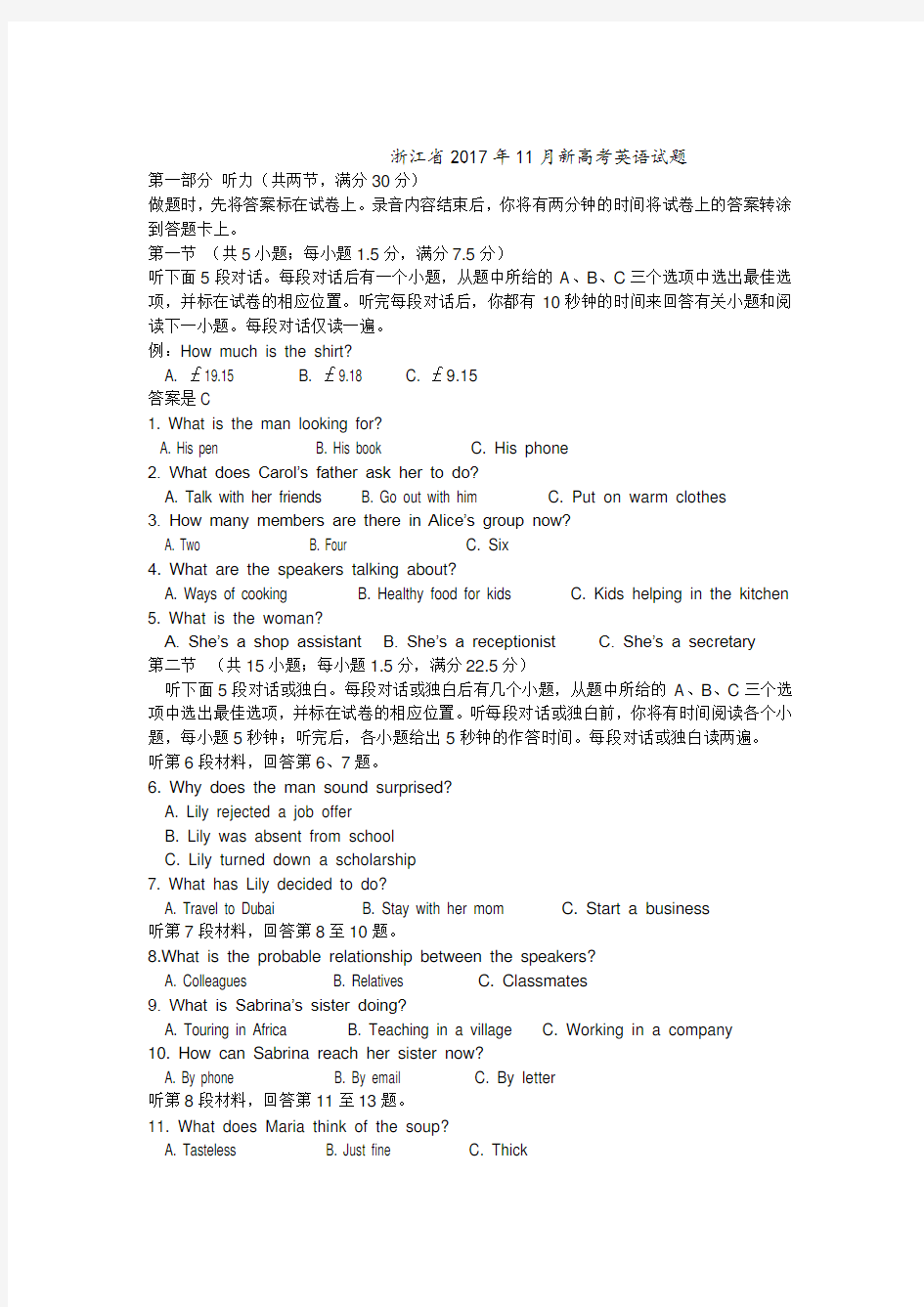
【高考英语】浙江省2017年11月新高考英语试题 含答案解析
- 格式:docx
- 大小:23.34 KB
- 文档页数:8


浙江省2017年11月新高考英语试题
第一部分听力(共两节,满分30分)
做题时,先将答案标在试卷上。录音内容结束后,你将有两分钟的时间将试卷上的答案转涂到答题卡上。
第一节(共5小题;每小题1.5分,满分7.5分)
听下面5段对话。每段对话后有一个小题,从题中所给的A、B、C三个选项中选出最佳选项,并标在试卷的相应位置。听完每段对话后,你都有10秒钟的时间来回答有关小题和阅读下一小题。每段对话仅读一遍。
例:How much is the shirt?
A. £19.15
B. £9.18
C. £9.15
答案是C
1. What is the man looking for?
A. His pen
B. His book
C. His phone
2. What does Carol’s father ask her to do?
A. Talk with her friends
B. Go out with him
C. Put on warm clothes
3. How many members are there in Alice’s group now?
A. Two
B. Four
C. Six
4. What are the speakers talking about?
A. Ways of cooking
B. Healthy food for kids
C. Kids helping in the kitchen
5. What is the woman?
A. She’s a shop assistant
B. She’s a receptionist
C. She’s a secretary
第二节(共15小题;每小题1.5分,满分22.5分)
听下面5段对话或独白。每段对话或独白后有几个小题,从题中所给的A、B、C三个选项中选出最佳选项,并标在试卷的相应位置。听每段对话或独白前,你将有时间阅读各个小题,每小题5秒钟;听完后,各小题给出5秒钟的作答时间。每段对话或独白读两遍。
听第6段材料,回答第6、7题。
6. Why does the man sound surprised?
A. Lily rejected a job offer
B. Lily was absent from school
C. Lily turned down a scholarship
7. What has Lily decided to do?
A. Travel to Dubai
B. Stay with her mom
C. Start a business
听第7段材料,回答第8至10题。
8.What is the probable relationship between the speakers?
A. Colleagues
B. Relatives
C. Classmates
9. What is Sabrina’s sister doing?
A. Touring in Africa
B. Teaching in a village
C. Working in a company
10. How can Sabrina reach her sister now?
A. By phone
B. By email
C. By letter
听第8段材料,回答第11至13题。
11. What does Maria think of the soup?
A. Tasteless
B. Just fine
C. Thick
12. What does Karl say can be added to the soup?
A. Salt
B. Onions
C. Pepper
13. Where are the speakers?
A. At home
B. At a restaurant
C. At a friend’s house
听第9段材料,回答第14至16题。
14. When will someone come to check the hot water?
A. This afternoon
B. Tomorrow
C. At the weekend
15. How did the students know about the flat?
A. From a friend
B. From a newspaper
C. From a house agency
16. What will the woman do to settle the problem about the fridge?
A. Pay the students for the new one
B. Get someone to fix the old one
C. Order one on the Internet
听第10段材料,回答第17至20题。
17. Who is the speaker?
A. an invited guest
B. A news reporter
C. A radio host
18. In what way has the speaker changed?
A. He speaks faster
B. He becomes heavier
C. He cooks more often
19. What is different for the speaker to get used to?
A. The food
B. The weather
C. The language
20. What does the speaker think of the French people?
A. A bit cold
B. Generous
C. Easy-going
第二部分阅读理解(共两节,满分35分)
第一节(共10小题;每小题2.5分,满分25分)
阅读下列短文,从每题所给的A、B、C和D四个选项中,选出最佳选项,并在答题纸上将该项涂黑。
A
When I was in fourth grade, I worked part-time as a paperboy. Mrs. Stanley was one of my customers. She’d watch me coming down her street, and by the time I’d biked up to her doorstep, there’d be a cold drink waiting. I’d sit and dri nk while she talked.
I told my father how Mrs. Stanley talked as if Mr. Stanley were still alive. Dad said she was probably lonely, and that I ought to sit and listen and nod my head and smile, and maybe she’d work it out of her system. So that’s what I did, and it turned out Dad was right. After a while she seemed content to leave her husband over at the cemetery(墓地).
I finally quit delivering newspapers and didn’t see Mrs. Stanley for several years. Then we crossed paths at a church fund-raiser(募捐活动). She was spooning mashed potatoes and looking happy. Four years before, she’d had to offer her paperboy a drink to have someone to talk with. Now she had friends. Her husband was gone, but life went on.
I live in the city now, and my paperboy is a lady named Edna with three kids. She asks me how I’m doing. When I don’t say “find,” she sticks around to hear my problems. She’s lived in the city most of her life, but she knows about community. Community isn’t so much a place as it is a state of mind. You find it whenever people ask how you’re doing because they care, and not because they’re getting paid to do so. Sometimes it’s good to just smile, nod your head and listen.